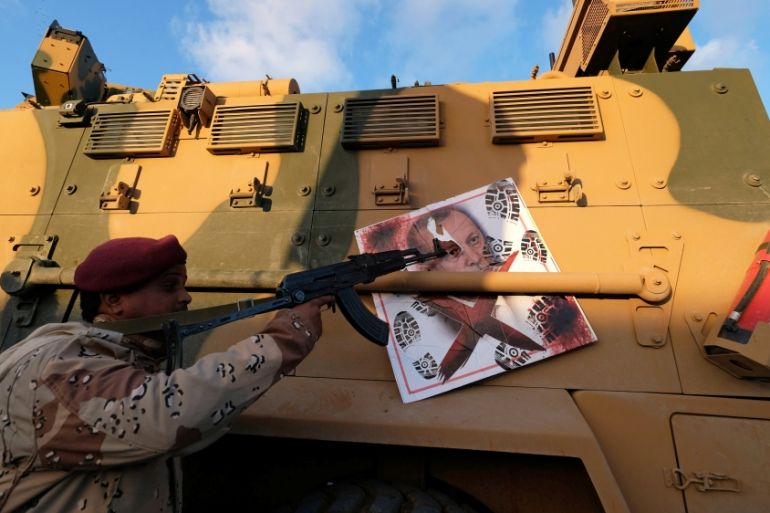Libya rivals hold UN-sponsored talks
The 10-member ‘Libya Joint Military Commission’ is tasked with supervising a truce that has all but collapsed.

Representatives from Libya‘s two warring parties began United Nations-led talks in Geneva on Monday, the world governing body said.
Five senior officers appointed by the UN-recognised Government of National Accord (GNA) and five appointed by eastern-based renegade military commander Khalifa Haftar were participating in the talks, the UN said in a statement.
Keep reading
list of 3 itemsNo more arms: World powers pledge to halt Libya weapon transfers
Timeline: Haftar’s months-long offensive to seize Tripoli
Known as the “Libya Joint Military Commission,” the 10-member body, created at the conclusion of a 12-nation summit held in the German capital Berlin last month, is tasked with supervising a tentative truce that has all but collapsed.
The meeting was being moderated by Ghassan Salame, Special Representative of the United Nations Secretary-General and Head of the United Nations Support Mission in Libya.
Countries that took part in the Berlin process reneged on their pledge to stop interfering in the armed conflict, and backed the belligerents with advanced weaponry in violation of a 2011 arms embargo, almost as soon the conference’s 55-point communique was issued.
At a UN Security Council briefing last week, Salame expressed his “anger and disappointment” over what he described as “unscrupulous actors inside and outside Libya who cynically nod and wink towards efforts to promote peace” while continuing to “double down on a military solution”.
Stalled offensive
Haftar launched an offensive in April to wrest control of the capital, Tripoli, from the GNA, headed by Prime Minister Fayez al-Serraj.
The military campaign, which Haftar says is aimed at removing “terrorist elements” from western Libya, has largely been stymied by GNA-aligned forces.
Analysts have in recent weeks noted the departure of several aircraft, many of them capable of carrying heavy loads, from the United Arab Emirates to military bases it controls in eastern Libya.
UAE continues large weapons transfer to #LNA/#Libya: Kazakhstan’s AZee Air’s Ilyushin Il76TD, 1of4 heavylifters shuttling between #Benghazi Benina and/or Al-Khadim AB in Al-Marj #Libya & Aqaba King Hussein & UAE, is flying likely towards Erbil completing morning delivery to Libya pic.twitter.com/HYk52xoY7j
— Yörük Işık (@YorukIsik) January 31, 2020
The UN has in the past accused the UAE of supplying Haftar with advanced weapon systems.
Abu Dhabi has emerged as one of the 76-year-old’s key supporters, due in part to their common aversion of Islamist groups such as the Muslim Brotherhood.
Meanwhile, Turkey became to first country to openly declare its involvement in Libya after its parliament in January ratified a motion by President Recep Tayyip Erdogan to deploy troops in support of the embattled GNA.
The annoucement came after Erdogan and al-Serraj signed in November a security cooperation agreement and seperate maritime demarcation deal that drew the ire of several eastern Mediterranean countries.
Under the new agreement, Turkey is able to conduct exploratory work in areas of the resource-abundant seabed that previously lied outside its exclusive economic zone.
Emadeddin Muntasser, a Libyan political analyst and human rights advocate, said the two parties were stockpiling weapons ahead of any future confrontation.
“Without overtaking Tripoli, Haftar cannot declare total victory. Without pushing him [Haftar] out of western Libya, the GNA cannot declare victory either,” Muntasser told Al Jazeera.
“Therefore, each side will continue to look for an opportunity to advance of consolidate its position whenever possible.”